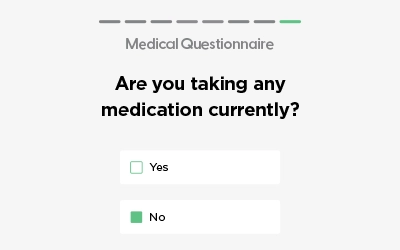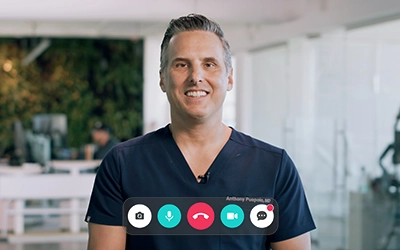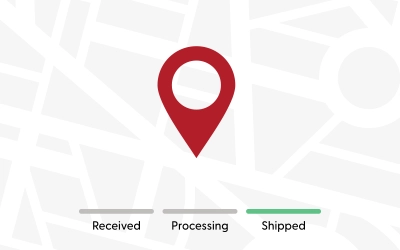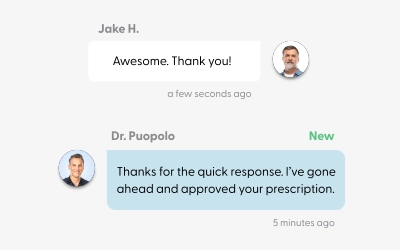
Insomnia Treatment
You can get effective and affordable prescription insomnia treatments online without seeing a doctor in person.
- Free online consultation
- FDA-approved sleep medications
- Treatments for as little as $1.70 per dose
- US-licensed healthcare providers
- Fast, free, discreet shipping
About Insomnia
Insomnia is a common issue that can affect your physical, mental, and emotional wellbeing. Prescription sleep medication can help.
What is insomnia?
Insomnia is a common sleep disorder that makes it difficult to fall asleep, stay asleep, or both.
There are two main types of insomnia: acute insomnia and chronic insomnia. Acute insomnia is a brief period of insomnia that is usually brought on by a stressful life event. The more severe type of insomnia is chronic insomnia, where a person has problems sleeping three or more days a week for three months or longer. Aside from impacting your energy levels and mood, insomnia can be detrimental to your health, productivity, and overall quality of life. Fortunately, men can treat insomnia and other health concerns online, right from their computers or smartphones. With Rex MD, the process is quick, discreet, and affordable — no in-person doctor visit needed.
What causes insomnia?
A wide variety of things can cause insomnia. Some common causes include stress, anxiety, depression, and a poor sleeping environment. Lifestyle factors including jet lag, shift work, or drinking alcohol or caffeine before bed can also lead to insomnia.
Can insomnia be treated?
Yes! Rex MD provides access to a variety of prescription sleep medications that can help patients enjoy quality, consistent sleep. A Rex MD affiliated healthcare provider will review the answers of your free online consultation to determine if a prescription sleep medication is right for you.
Explore Sleep Medications
Doxepin
(Generic Silenor)
- Doxepin is a tricyclic antidepressant that is commonly used to treat insomnia.

Ramelteon
(Generic Rozerem)
- Ramelteon is a hypnotic/sedative medication that’s used to treat insomnia.

Sleep FAQs
How much sleep do you need?
Most adults need between seven and nine hours of sleep each night, but the optimal amount varies from person to person. The “right” amount of sleep will make you feel rested and alert.
Additionally, new research reveals that it’s not just the hours of sleep that matter. The quality and consistency of your sleep can have a huge impact on your overall health and wellbeing.
What are the benefits of getting good sleep?
Consistent, quality sleep can help strengthen your immune system, prevent weight gain, improve heart health, boost your mood, enhance your focus, increase your productivity, sharpen your memory, and more.
Can you cure insomnia without medication?
It depends on the person. While prescription sleep medication from Rex MD is an excellent option for people who are struggling to sleep, it’s not the only option. Here are some additional strategies you can use to get more quality, consistent sleep:
- Maintain a regular sleep schedule. Try to go to bed and wake up at the same time each day. Establishing some consistency will help reinforce your natural circadian rhythm, or its sleep-wake cycle.
- Move your body. Clinical research shows people who engage in at least 30 minutes of moderate aerobic exercise a day may see positive changes in their natural sleep patterns.
- Avoid large meals before bedtime. Ideally, wait at least three hours between eating your last meal and heading to bed. Eating prompts the release of insulin, which can impact your ability to fall asleep.
- Create a peaceful sleeping environment. Make sure your bedroom is cool, dark, and quiet — with as few distractions as possible. Light-blocking window coverings, earplugs, and an eye mask are all good ideas.
- Give yourself a digital curfew. Avoid looking at bright screens at least two hours before bed. “Unplugging” will reduce your exposure to blue light, which suppresses melatonin, and help you wind down.
Is prescription sleep medication effective?
Yes! Rex MD provides access to prescription sleep medications that have shown to help patients fall asleep faster and stay asleep longer.
What sleep medications are available through Rex MD?
Rex MD provides access to two options: Ramelteon and Doxepin. Ramelteon works like a natural substance called melatonin that is produced by your body. It regulates your sleep-wake cycle (circadian rhythm) to help you fall asleep faster and stay asleep longer. Doxepin works by slowing activity in the brain to allow sleep. More specifically, it blocks your body’s reactions to histamines, compounds that promote wakefulness and inhibit deep sleep. A licensed healthcare provider will review your information to determine if one of these two treatments is right for you.
Is prescription sleep medication through Rex MD addictive?
No. The prescription sleep medications offered through Rex MD are not controlled substances. That means they are not habit-forming and safe to use every night, if needed. This makes them a more desirable treatment option than a controlled substance like Ambien, which poses a high risk for dependency.
How does poor sleep contribute to weight gain?
Insufficient sleep can disrupt your body’s production of leptin, a hormone that regulates your appetite. This can make you extra hungry and slow down your metabolism, causing the number on the scale to rise.
Which prescription sleep medication is the best?
It depends on the patient. A doctor will review your information to determine which medication best fits your needs.
How is Rex MD different from other men’s healthcare providers?
Rex MD is an online treatment provider that allows you to get prescription sleep medication quickly and discreetly — without sitting in a waiting room or seeing a doctor in person. It also offers fast, free shipping, which means you don’t have to pick your medication up at your neighborhood pharmacy. Last but not least, Rex MD provide access to FDA-approved, prescription sleep treatments that are more affordable than many competitors.
Steps for Getting Treatment

1. Free online consultation
Answering questions about your symptoms and health history.

2. Personalized review
If appropriate a licensed physician will prescribe a treatment plan that meets your needs.

3. Fast, discreet shipping
Your medication will ship out in discreet packaging within two days.

4. Ongoing support
Contact our team anytime to discuss your treatment and make adjustments, if needed.
Real Members.
Verified Reviews.
Michael G.
“I’ve attempted to use two other sites and they made it exceptionally difficult and drawn out. Your system was quick and efficient.”
Ben T.
“I can’t think of anything else that could be better, this system is perfect.“
Dan D.
“Actually I was skeptical at first. After a painless questionnaire everything worked out great.”
Scott S.
“Everything was perfect. My prescription showed up on time the doctor was easy to talk to - I couldn’t be happier with the product.”
Alan S.
“Keep making your customer service awesome for all customers.”
Dave P.
“Was actually easy for a non computer savvy old man.”
John B.
“Love your service and product. Changed everything for the better. THANK YOU !!!”
Chris W.
“There’s always improvements on everything but this service is well organized and I think a lot of customers will be very satisfied like I am.”
Billy I.
“The service was great and the price was affordable.”
Michael G.
“I’ve attempted to use two other sites and they made it exceptionally difficult and drawn out. Your system was quick and efficient.”
Ben T.
“I can’t think of anything else that could be better, this system is perfect.“
Dan D.
“Actually I was skeptical at first. After a painless questionnaire everything worked out great.”
Scott S.
“Everything was perfect. My prescription showed up on time the doctor was easy to talk to - I couldn’t be happier with the product.”
Alan S.
“Keep making your customer service awesome for all customers.”
Dave P.
“Was actually easy for a non computer savvy old man.”
John B.
“Love your service and product. Changed everything for the better. THANK YOU !!!”
Chris W.
“There’s always improvements on everything but this service is well organized and I think a lot of customers will be very satisfied like I am.”
Billy I.
“The service was great and the price was affordable.”










